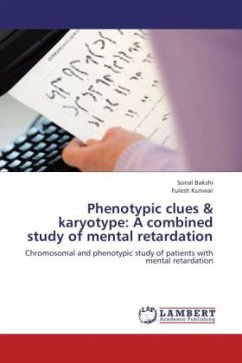
Study of mental retardation by morphogenetic & cytogenetic analysis
Evaluation of mental retardation by morphogenetic and cytogenetic analysis
Versandkostenfrei!
Versandfertig in 6-10 Tagen
39,99 €
inkl. MwSt.

PAYBACK Punkte
20 °P sammeln!
Mental retardation is a common disorder, which imposes a large medical, psychological and social burden. It affects about 3% of the population, yet the pathogenesis is poorly understood. The prevalence and incidence of mentally retarded cases is alarming. Studies of the frequency and risk factors for cognitive disorder in children have been almost entirely restricted to developed countries, need of the hour is more conclusive research in this field to find out the risk factors associated with mental retardation . . However Diagnostic outcomes of these studies provided little information for th...
Mental retardation is a common disorder, which imposes a large medical, psychological and social burden. It affects about 3% of the population, yet the pathogenesis is poorly understood. The prevalence and incidence of mentally retarded cases is alarming. Studies of the frequency and risk factors for cognitive disorder in children have been almost entirely restricted to developed countries, need of the hour is more conclusive research in this field to find out the risk factors associated with mental retardation . . However Diagnostic outcomes of these studies provided little information for the evaluation of patients. Accurate diagnosis of etiology has specific implication regarding treatment. Management of possible associated condition, prognosis, and estimation of recurrence risk and the design of prevention program .The information on possible risk factors and causes of mental retardation can be used for genetic counseling and pregnancy supervision. Monitoring of environmentalrisk factors could prevent our human health system from a serious life long disability and burden of the society could be reduced.












